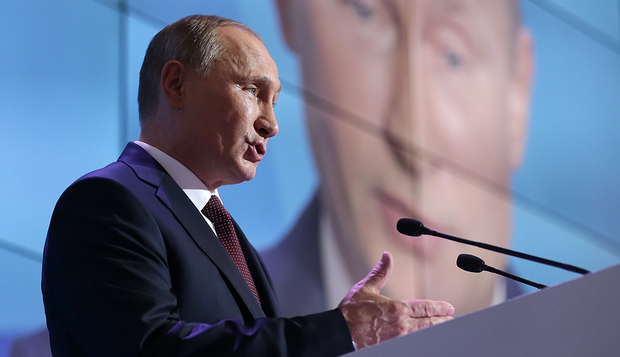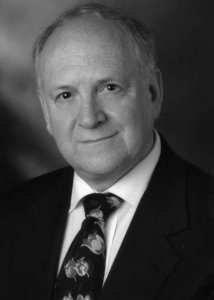
Marc Champion
Marc Champion is a Bloomberg View editorial board member. Follow him on Twitter.
If you thought Russian President Vladimir Putin might be enjoying himself now that he has blocked the U.S. from carrying out air strikes in Syria, made U.S. President Barack Obama look weak and positioned himself as a global statesman and peacemaker, you could not be more right.
Putin made his annual appearance today at the Valdai Club, a gathering or about 200 academics and research analysts focused on Russia, and he had a ball. He cracked jokes all evening -- mostly poking fun at what he sees as Western hypocrisy, double standards and moral decay.
For example, when the legal troubles of Putin’s old friend, former Italian Prime Minister Silvio Berlusconi, came up, he said: "Berlusconi is on trial now because he lives with women, but if he were a homosexual, they wouldn’t lay a finger on him.” That one got a lot of laughs.
More seriously, Putin defended a recent law against promoting homosexuality in Russia, arguing that this does not amount to discrimination or oppression, and noting that some U.S. states still have (disused) laws on the books that criminalize homosexuality. Russia should be allowed to make its own choices about what is right, he said. He also suggested gay marriage was just bad policy. "We are dying out. Europeans are dying out. Same sex marriages do not produce children,” he said, going on to ask whether Europeans really want to rely on immigration to boost their populations.
This was a huge change from last year, when participants said Russia’s long-serving president had appeared defensive, irritable and uncomfortable throughout the meeting. He had also changed the format of the event, giving a speech and taking part in a panel akin to a town hall meeting, rather than the closed marathon question and answer dinners of previous years. Also new was that the club invited opposition leaders, who were called on to ask Putin questions. And the whole event was televised.
By the end of the day, Putin had taken over from the moderator and was playing talk show host as -- clearly off the cuff -- he zapped questions around a panel consisting of the former German Defense Minister Volker Ruehe, former French Prime Minister Francois Fillon, former Italian Prime Minister Romano Prodi and American Russia specialist Dmitri Simes.
Ruehe, for example, was asked how he thought the Sept. 22 German elections would turn out. Angela Merkel will become chancellor again, Ruehe began -- "Third time!” quipped Putin, an unsubtle dig at all the Western commentators who have criticized him for returning to power for a third term as president in 2012, after an interlude as prime minister. Simes was asked about the U.S. budget deficit. When Fillon hesitated to answer a question on whether he plans to run for president, Putin goaded him with an "I’ll answer if you do” routine -- yes, Putin said, he doesn’t exclude running for a fourth term.
It took Putin a little while to warm up, after his speech about Russia’s need to re-create a national identity based on its unique history and culture, avoiding Europe’s ethical torpor. "The time when ready-made lifestyle models could be installed in foreign states like computer programs has already passed,” he said.
Many of the questions put to the president concerned Syria. He was widely praised by the audience for his role in attempting to broker a deal to remove and destroy Bashar al-Assad's chemical weapons, and he warned that he was not solely responsible for securing the outcome and that this was by no means guaranteed. He also volunteered that Syria only developed its chemical weapons stockpile in response to Israel’s development of a nuclear arsenal. He said this, too, should be eliminated, so that these weapons don’t spread all over the world in the way that gunpowder did in the late Middle Ages.
According to Ariel Cohen of the Washington-based Heritage Foundation, who was in the audience, Putin appeared to be stocking up potential negotiating cards for the talks. Any real attempt to link the two issues would certainly kill the deal.
Putin also repeated many of the arguments he made about the dangers of international interventions in his recent op-ed article in the New York Times, describing at length how he had the idea of writing the piece. He said he added a paragraph attacking "American exceptionalism” at the last minute, after Obama used the term in his speech on Syria earlier this month.
Putin was pressed several times on the rudimentary level of democracy in Russia, with Ruehe in particular taking advantage of the televised nature of the event to press Putin to embrace youths who want to get involved in politics, even if they oppose him. Putin took it all in his stride. He noted that opposition candidates just won several local elections in Russia, and said Russia was developing its own style of democracy at its own pace -- young opposition leaders are welcome if they are "creative,” he said affably. He even left open the possibility of an eventual amnesty for protesters who are awaiting trial in jail for clashing with police during protests on Moscow’s Bolotnaya Square in May 2012.
This was a very relaxed and confident Russian leader, at the very top of his game.



_jpg/250px-ElbeDay1945_(NARA_ww2-121).jpg)







